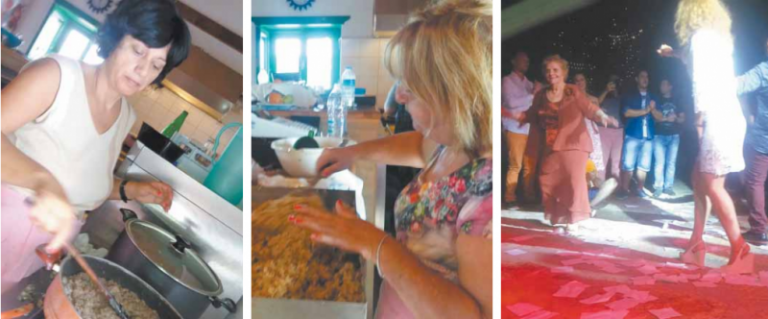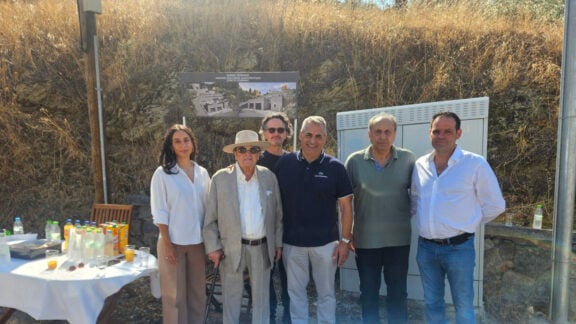As a little girl, I ran barefoot through the streets of Perth. I was a typical Australian child; carefree and loving life. But I was more than that. We played in the street, we played at the beach. We played with our friends. Our friends were our cousins. I was a typical Australian child. But I was more than that. And I AM still more than that. My mother was Kastellorizian. And I thank my father every day for recognising who she was.
We have many differences because of where we were born and where we grew up. But we have many things in common. For me, I see it is the blood pulsing through our veins, making the beat of our hearts; it is the breath filling our spirit with a love of life.
And I am a Kastellorizian woman. Not because I was born on this island. I wasn’t. Not because I grew up here. I didn’t. But when I first stepped off the plane all those years ago, my spirit was finally at peace. And I was home.
I love the women here. They are strong. They are devoted to their families. They are funny. They gossip with each other and about each other. But if one is in trouble, they are all there to help. We have many differences because of where we were born and where we grew up. But we have many things in common. For me, I see it is the blood pulsing through our veins, making the beat of our hearts; it is the breath filling our spirit with a love of life.
They work for their families. They are devoted to their families. They work 15 hours a day, every day during the tourist season. During this time, their children are left to play together until late into the night. But the strong ties their mothers have forged keep them safe.
They have seen little of the world. Many have not gone past Athens or Rhodes. Some have never left Kastellorizo. Most of them did not stay at school as long as they could have done; some of them never went to school at all. Many have never known the joy of reading a book, of immersing themselves in the fantasies and stories of others. They got their news from whispers not from newspapers. They got their stories from their families. And families were, and are, everything to them.

They love to cook. Their cooking is not just for nourishment for the body. Mealtimes are used to nourish the spirit. Eating is necessary to keep their families bonded and to invite friends to share their table. Food is what is remembered. Our mothers’ most beloved recipes; the warm and happy moments when she gave you a spoonful of what was to come. The comforting aromas of our favourite dishes. Memories of family Easter and Christmas tables. Laughing. Singing. Eating. Loving. Grandmothers passing tidbits, sweets into your hand. A secret. Between them and you. The ties that bind.
Their hardships have been recorded. We have heard many of the challenges they faced. When the island was a home for sea merchants, the women stayed at home for six or more months at a time. Their husbands would return, and when they left again for destinations far away, some women found themselves pregnant again. And another six or more months without support. Bearing their babies with only women to support them. No communication. No way of knowing when or if their husbands would return. On this rock. Through storms and searing summers. Feeding children, nurturing, disciplining, taking care of the house and the household. Dealing with illnesses. Often without any male support for very long periods of time.
Perhaps this life of responsibility is what has developed our survival gene; our matriarchy, where women run the house and the family. Because this strength has been in the Kazzie woman ever since. They have kept their families together through wars, famine, natural disasters. They have lost their families to wars, famine, and disasters.
When the men returned, the women moved into the background. Their husbands were kings. Their demands were fulfilled. They were at their beck and call. And these were more often than not men who had been chosen for them.
Right up until the 20th century, arranged marriages had been the norm: payments of family debts, favours, simple match-ups. Through the centuries young teenage girls were presented with who they were going to spend the rest of their lives with, sometimes days, moments before their marriage. And all methods were used to ensure they were in pristine condition.
Kastellorizo has the most beautiful back streets. They are narrow, enchanting and secretive. This is where women walked between destinations. Not because it was a lovely walk, but so they could not ‘tempt’ the men sitting on the limani, drinking coffee, solving the problems or their world.
At puberty, girls were locked up in their houses until they could be handed over to a man, ‘in good condition’. So the women came up with a fairy tale to let them move freely in the streets.
The folklore of the sleepwalkers is rumoured to have emerged to enable women to visit each other without fear, to leave their ‘prisons’. They were said to have dressed in their finest, leaving their houses in a sleep-like trance and it was understood that they should not be disturbed. Some tell this story, that they covered themselves with a customary long shirt, to appear ghostlike, to deter even further, any inquisitors. Either way, it was a very creative way to overcome a difficult situation.
Education? For most, there was none. The girls’ school was built by the philanthropist, Loukas (Santrape). But even today, if you ask most women over 50, they had little or no education at all.
And what has improved is that now all girls on the island have an education. The current generation of mothers can see there are many opportunities for their daughters, if only they can access them. They are equal in applying for student exchange places. They are equal in the classroom. Until recently, it would have been unheard of to send a young girl away without family chaperoning. Mothers today can see the world is open for their girl children. But it is not made easy. To educate any child on Kastellorizo, even today so that they can enter university, is a challenge.
In Greece, the teachers are hired for subjects, not for class requirements.

So if a girl (or boy) needs a subject such as biology to go on to science or medicine, if there is no teacher for biology they either have to change the direction of their dreams, or study externally. So mothers are as always, finding a way. They have started sending their children to Rhodes or the mainland to complete their high school education, if necessary subjects are missing. The sacrifice of this to a Kastellorizan mother cannot be measured. Especially if the child is a girl.
The future women of Kastellorizo, the nurturers of our amazing culture, are taking us into the 21st century. Slowly, untwisting some of the knotted ropes of the past, finding a new path to the future.
With the help of the internet, and with their own travel experiences they are opening up the world to their daughters. The future is beckoning. It still will not be easy.
The isolation of the island, the fear of the unknown will cause stumbling blocks along the road, but I can see in the girls’ eyes the excitement of what could be for them. What will be for some of them, because their genes, from their mothers, from their grandmothers, from their great grandmothers, will get them there.
They, we, are Kastellorizian women, and I would rather be with them, here, than anywhere else in the world.
*This article was originally published in Filia, the publication of The Friends of Kastellorizo. For more info email coordinator@kastellorizo.com








